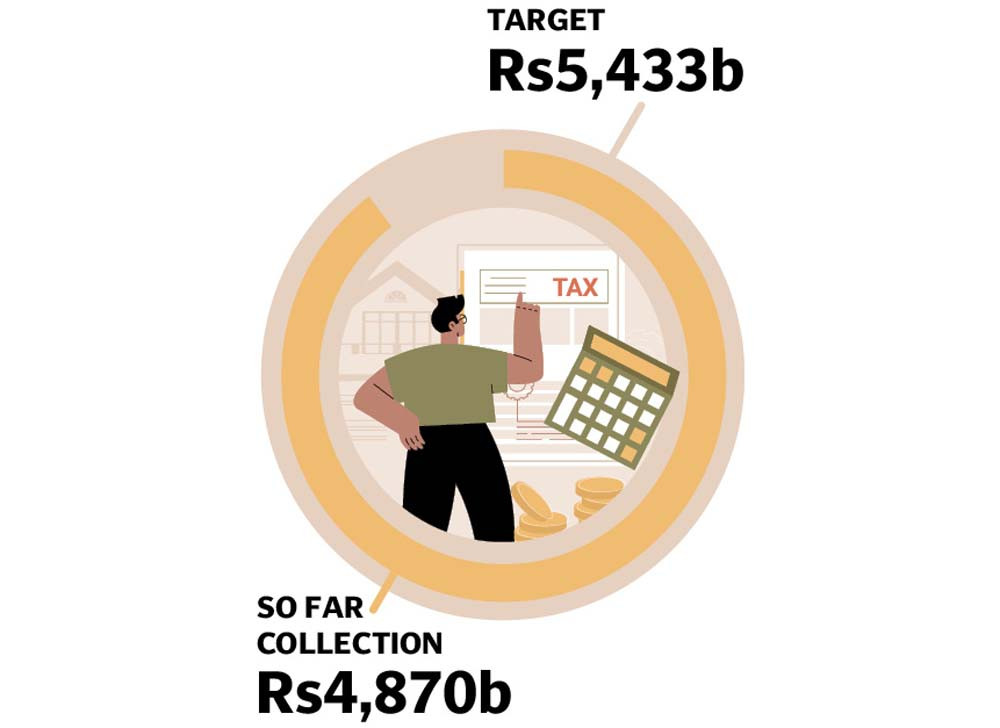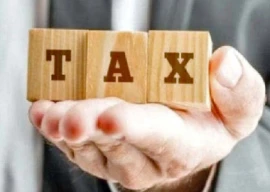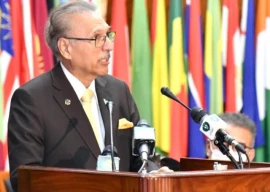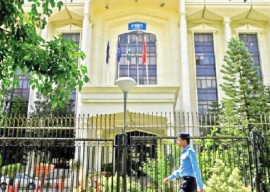
The Supreme Court of Pakistan on Wednesday granted interim relief against the 20% deemed income tax on real estate, which will partially dent revenue collection, as taxmen face a gigantic task of collecting Rs560 billion in one week to achieve the nine-month revenue target.
Headed by Chief Justice of Pakistan Justice Umar Ata Bandial, a special bench allowed taxpayers to pay only 50% of the assessed deemed income tax until final decision was made by the apex court.
The court made some sharp remarks about the performance of Federal Board of Revenue (FBR) and its focus on an already limited taxpayer base to achieve targets.
The apex court barred the FBR from taking any adverse action against the taxpayers, if they deposited half of the assessed tax, according to the interim decision.
Faisal Siddiqi advocate represented the petitioners in the court, which also inquired from the FBR about the constitutional mandate to slap taxes in an area which was within provincial domain.
Realty and manufacturing sectors have filed petitions against Section 7E that the government introduced in June last year to impose taxes on people who derived income equal to 5% of the fair market value of capital assets situated in Pakistan, who will be charged tax at the rate of 20%.
The FBR says the effective tax rate is 1%, aimed at collecting an additional revenue of Rs15 billion. Initially, the estimate was Rs25 billion, which the FBR reduced after the government excluded some sectors from the scope of the tax, which was also contested by the petitioners, terming it discriminatory legislation.
For the current fiscal year, the government has set the annual tax collection target of Rs7.640 trillion for the FBR. For the July-March period, the target is Rs5.43 trillion, but the FBR collected Rs4.87 trillion as of Wednesday.
This leaves it with a balance of over Rs560 billion, which it has to collect in the remaining six working days with an average of Rs94 billion a day. A major tax injection is expected on Friday and Monday.
During the first eight months, the FBR claimed that it sustained a Rs213 billion shortfall but the Ministry of Finance and the Accountant General for Pakistan Revenue data suggested a shortfall of Rs233 billion.
Any further shortfall will bring performance of the FBR under critical review. It is struggling to achieve the targets despite a Rs170 billion mini-budget and record inflation of 31.5%. But so far the FBR has been unable to cash in on the high inflation reading through higher sales tax collection.
The International Monetary Fund may also ask Pakistan to take additional revenue measures against any monthly shortfall, according to sources.
Sources said that against March target of Rs727 billion, the FBR had so far collected Rs377 billion, or 52% of the target. Sales tax collection remained at Rs147 billion, higher by just 7%.
The FBR needs to collect Rs276 billion in March on account of sales tax just to meet the monthly target.
So far, the income tax collection has remained exceptional, showing 35% growth for the month.
The Supreme Court remarked during the hearing that the FBR was not a trusted organisation and it was again burdening those who were paying their taxes.

design: Ibrahim Yahya
Section 7E has faced serious constitutional challenges since the beginning as many argue that the government may find it difficult to defend the legal provision in courts that falls within the purview of provincial taxation.
The Sindh High Court (SHC) had given the decision in favour of the FBR but its legal team on Wednesday could not provide solid reasons to satisfy the court whether the FBR had taxed real estate assets or the income.
The matter had also been challenged in the Lahore High Court that wrote in its interim order that Section 7E taxation had been done on the basis of “speculative value of the property”, which appeared to be in contradiction to Section 116 that deals with the wealth statement being submitted by a taxpayer along with the tax return.
The petitioners prayed before the apex court whether Section 7E was in violation of Entry 47 and Entry 50, Fourth Schedule, Constitution 1973, as it can neither be considered as deemed income from property nor it is in the legislative competence of the federal legislature to enact such a law on the market value of immovable property.
The petitioners submitted that the SHC misinterpreted and misapplied the Ellahi Cotton Mills Limited vs Federation of Pakistan judgement in holding that there were no limits to the concept of deemed income even though the Ellahi Cotton judgement holds that there are limits to the notion of deemed income.
Petitioner Khalid Mehmood is the Chief Executive Officer and Managing Director of the largest pharmaceutical company, Getz Pharma (Pvt) Limited, in Pakistan. He owns more than one immovable property and, thus, comes within the scope of Section 7E.
The petitioner’s immovable properties have been duly declared in his income tax returns. The petitioners also pleaded before the court that Section 7E was discriminatory, which is evident from the fact that certain individuals, along with their successors-in-interest, are exempted from the applicability of the deemed income tax.
Published in The Express Tribune, March 23rd, 2023.
Like Business on Facebook, follow @TribuneBiz on Twitter to stay informed and join in the conversation.


1731933289-0/BeFunky-collage-(68)1731933289-0-165x106.webp)


1729662874-0/One-Direction-(1)1729662874-0-165x106.webp)















COMMENTS (1)
Comments are moderated and generally will be posted if they are on-topic and not abusive.
For more information, please see our Comments FAQ